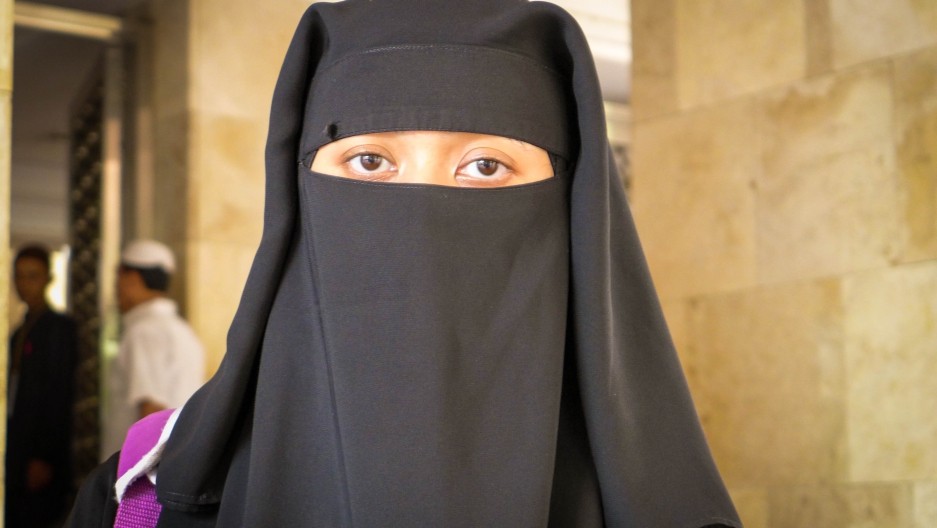
Juanita Vyatri, 32, works as a mobile application designer in Jakarta, Indonesia..
Jakarta, MINA — When Indonesian mobile phone app developer Juanita Vyatri started wearing the niqab face veil about 10 years ago, strangers would gaze at her with a mix of curiosity and suspicion, reports DPA.
“At that time, people thought that those who wore the niqab were terrorists or the wives of terrorists,” says 32-year-old Vyatri, sitting in front of a laptop in her office just outside the capital Jakarta.
The niqab leaves only her eyes visible, and she wears it with an abaya – a flowing full-length gown. “Suspicious stares are rare nowadays. I think people are more accepting, as more women are wearing the niqab,” says Vyatri.
Whether Muslim women should be allowed to wear the niqab, despite greater acceptance of the practice, remains a controversial issue in the world’s largest Muslim-majority country.
Also Read: Peaceful Muharram: 2 Million Eid Gift Packages to Orphans and Persons with Disabilities
A debate erupted in March in Indonesia after several universities threatened to expel students who wore the face veil.
Many Muslim women in Indonesia wear jilbab headscarves, which do not cover the face. But a small and growing minority, including some television personalities, have adopted the niqab.
The phenomenon has caused uneasiness among some Indonesians, who are worried about rising religious fundamentalism in a country that prides itself on moderate Islamic traditions.
A survey last year by the Alvara Research Center, a local think tank, found that 23 per cent of Indonesian university students supported the establishment of an Islamic state.
Also Read: Responsible Gadget Use Strengthens Healthy Digital Literacy
Opponents of the niqab argue that it is not a requirement in Islam, and that it is linked to Arab culture.
The fact that the wives of Indonesian Muslim militants arrested on charges of terrorism have been seen on television wearing the niqab has not helped dispel the stigma about the face covering.
The Sunan Kalijaga State Islamic University in the central Java city of Yogyakarta said in March that it would provide counselling for female students who wore the niqab because of concerns that they were susceptible to extremist ideologies.
The plan was shelved following an outcry from Muslim groups, who said the move was a violation of the right to practice religion.
Also Read: KMP Tunu Pratama Jaya Sinks, Marking Another Tragedy in the Bali Strait
Some feminists also opposed the move, arguing that women should be allowed to make a choice over what clothes they wear.
Last year, the government decided to ban Hijb ut Tahrir Indonesia, a local branch of an international organization seeking to establish a caliphate, or Islamic rule, across the Muslim world.
Niqab Squad
A group of Indonesian women calling itself the Niqab Squad is seeking to dispel the association in Indonesia between the niqab and Islamic extremism.
Also Read: Prominent Legal Expert Abdul Rahman Saleh Passes Away
The group, whose members include doctors, lawyers and fashion designers, holds regular gatherings, during which members take part in activities such as learning photography, horse riding and archery.
It has branches in Malaysia, Taiwan – where many Indonesians work – and South Africa, the group says.
“When women wear the niqab, they are not judged by how they look. Niqab is a symbol of piety and dignity,” says Indadari Mindrayanti, one of the founders of the Niqab Squad and a former TV personality.
“Our goal is to socialize the niqab, so people will no longer call us names such as ninjas or mummies,” she says.
Also Read: A Joyous Moment for Indonesian Volleyball: Megawati Hangestri Ties the Knot
“When people get used to seeing women wearing the niqab, hopefully the stigma will disappear.”
Some Indonesians contrast the rising conservatism in their country to reforms in the Arab world, especially in Saudi Arabia under Crown Prince Mohammed bin Salman.
Saudi Arabia recently lifted a ban on cinemas and will soon allow women to drive, among other steps towards greater freedoms in a country that has long been associated with Salafism, an ultra-conservative branch of Islam.
Yahya Cholil Staquf, a Muslim scholar from the Nahdlatul Ulama, the country’s largest Islamic organization, supports a ban on the niqab, saying that it is not part of Islamic tradition.
Also Read: Indonesia’s BPOM Seals Deal with Sudan, Paving Way for Herbal Exports
“It may seem harmless, but we should look at the mindset behind the niqab, which if not countered, could lead to extremism,” Staquf says.
“Niqab should not be allowed in public places where people should be identifiable,” he adds.
Mobile developer Vyatri says the start-up technology company she works for has no objections about her wearing the niqab.
“I think in the technology sector people are more open-minded,” says Vyatri, who also teaches children in her neighbourhood how to code. “What matters is whether you can do your job well.”
Also Read: Maemuna Center Joins Indonesian Women’s National Movement to Boycott Pro-Israel Products
She concludes: “I’m not bothered by the controversy and I rarely read the news about it.” (T/RS5/RS1)
Mi’raj Islamic News Agency (MINA)
Also Read: MUI Urges Indonesian Government Action Amid Israel Product Boycott




























![MUI Chairman for Foreign Relations and International Cooperation, Sudarnoto Abdul Hakim (center) at the One Million Women for Gaza Press Conference entitled "Women Boycott Pro-Israel Products" held at the Swiss-Belinn Cawang Hotel, East Jakarta, Thursday (3/7/2025). [Photo: Arina/MINA]](https://en.minanews.net/wp-content/uploads/2025/07/20250703_144042-scaled-1-300x225.jpg)




 Mina Indonesia
Mina Indonesia Mina Arabic
Mina Arabic